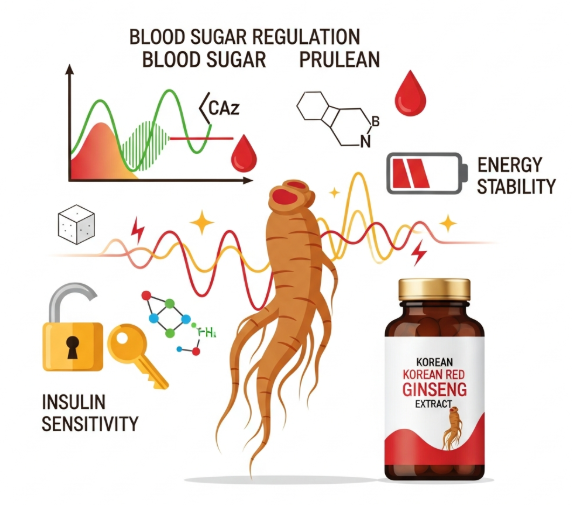Maintaining healthy blood sugar levels is central to energy, cognitive performance, metabolic efficiency, and long-term wellness. Even subtle fluctuations in glucose can contribute to fatigue, mood instability, and metabolic stress. Insulin, the hormone that facilitates glucose uptake into cells, plays a pivotal role in keeping energy production steady and tissues nourished.
Korean Red Ginseng (Panax ginseng), a renowned adaptogenic herb, has been extensively studied for its effects on glucose metabolism, insulin responsiveness, oxidative stress, and energy regulation. While it is not a treatment for diabetes or any medical condition, research indicates that its bioactive compounds may support healthy blood sugar regulation and metabolic resilience.
This article examines the mechanisms through which Korean Red Ginseng can help promote stable glucose levels and overall metabolic balance.
1. Understanding Glucose and Insulin Dynamics
After a meal, carbohydrates are broken down into glucose, which enters the bloodstream. Insulin signals cells in muscles, fat, and liver to absorb glucose for energy or storage. Efficient insulin signaling ensures:
- Stable energy levels
- Optimal nutrient utilization
- Balanced metabolic function
- Reduced oxidative stress
Inefficiencies in this system can lead to energy dips, brain fog, fatigue, and metabolic strain.
2. Enhancing Insulin Sensitivity with Ginsenosides
Ginsenosides, the primary bioactive compounds in Korean Red Ginseng, play a significant role in insulin signaling:
- Enhance cellular responsiveness to insulin
- Promote glucose uptake into muscle and liver cells
- Activate AMPK, the energy-regulating enzyme
- Reduce oxidative stress interfering with insulin pathways
By supporting insulin sensitivity, Korean Red Ginseng helps stabilize glucose utilization and sustain energy levels throughout the day.
3. Modulating Post-Meal Glucose Response
Spikes in blood sugar after meals can lead to energy crashes and cravings. Korean Red Ginseng has been studied for its ability to:
- Moderate postprandial glucose excursions
- Reduce oxidative stress following carbohydrate intake
- Support balanced energy delivery to cells
This natural modulatory effect promotes stable energy and mental clarity after meals.
4. Antioxidant Protection for Metabolic Health
Oxidative stress can impair insulin signaling and cellular glucose utilization. Korean Red Ginseng provides potent antioxidants, including:
- Ginsenosides Rg1, Rb1, Rg3
- Ginseng polysaccharides
These compounds help:
- Neutralize reactive oxygen species (ROS)
- Protect metabolic tissues
- Support mitochondrial ATP production
- Reduce inflammation associated with glucose metabolism
Antioxidant support reinforces metabolic resilience and long-term energy balance.
5. Supporting Liver Function in Glucose Regulation
The liver regulates blood glucose by storing glycogen and releasing glucose as needed. Korean Red Ginseng supports liver efficiency through:
- Enhancing glycogen storage and mobilization
- Reducing oxidative stress in hepatocytes
- Supporting overall metabolic processing of glucose
A healthy liver contributes to smooth glucose regulation and sustained energy.
6. Energy Production and Fatigue Reduction
Inefficient glucose metabolism can result in low cellular energy, leading to fatigue. Korean Red Ginseng supports:
- Mitochondrial ATP production
- Efficient oxygen utilization in muscle and neural tissue
- Reduced oxidative stress that drains energy
This promotes steady energy, improved physical performance, and enhanced cognitive endurance.
7. Cognitive Function and Glucose Utilization
Stable blood sugar is essential for optimal brain function. Fluctuations can impair focus, memory, and mood. Korean Red Ginseng contributes to cognitive wellness by:
- Supporting efficient glucose delivery to neurons
- Reducing oxidative stress in neural tissues
- Enhancing attention, memory, and mental clarity
Cognitive support complements physical energy, creating a holistic metabolic balance.
8. Red Ginseng Forms and Bioavailability
The efficacy of Korean Red Ginseng depends on preparation:
- Whole root – traditional tonic
- Powder/capsules – standardized ginsenoside content
- Fermented extracts – improved bioavailability
- Concentrates – high-potency, convenient forms
High-quality extracts provide consistent support for blood sugar and metabolic balance.
9. Lifestyle Synergy
For optimal metabolic support, Korean Red Ginseng should be combined with:
- Balanced, low-glycemic diet
- Regular physical activity
- Adequate sleep and recovery
- Stress management practices
- Antioxidant-rich foods and hydration
Together, these habits amplify the stabilizing effects of Korean Red Ginseng.
Conclusion: Holistic Blood Sugar Regulation with Korean Red Ginseng
Korean Red Ginseng supports healthy glucose regulation through:
- Enhanced insulin sensitivity
- Moderation of post-meal glucose spikes
- Antioxidant protection of metabolic tissues
- Liver support for glycogen management
- Sustained cellular energy production
- Cognitive performance support
Incorporating Korean Red Ginseng into a holistic wellness routine helps maintain stable energy, metabolic efficiency, and overall vitality — all without making medical claims.







